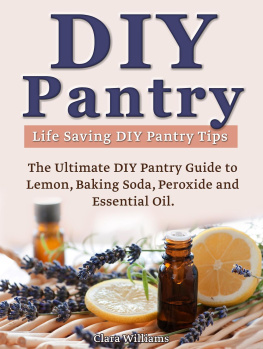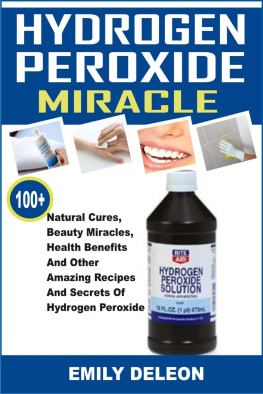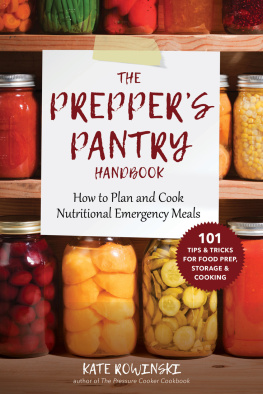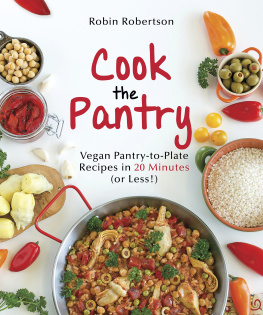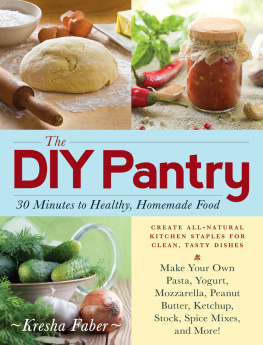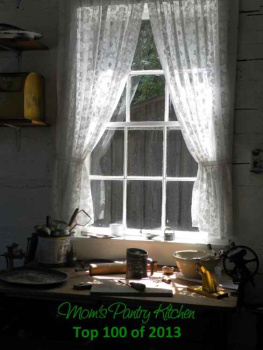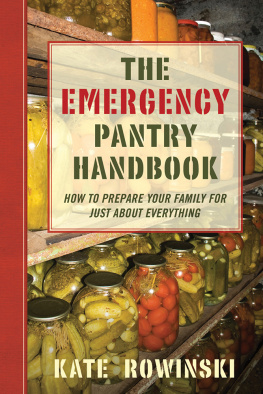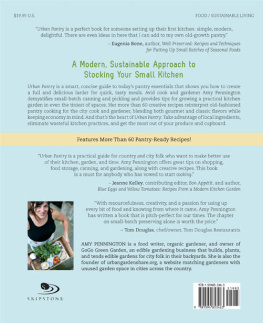DIY Pantry
A Beginners DIY Pantry Guide to Lemon, Baking Soda, Peroxide and Essential Oils. Life Saving DIY Pantry Tips
(Prepper's Pantry)
Table of Content
Introduction
P eople experience many different problems at home and often find that the remedies to these problems available in the market are either not cost friendly or safe. Buying most of these things in the market will most of the times leave your pocket itching. What is worse is the fact that these remedies that you get at such costs may be harmful to you and your family. Other times they dont even get to do a better job at what they are intended for. This is because there is no guarantee or prove that they are made using the ingredient shown at the label. This book is guide to stocking up of a pantry. It covers a number of things you will need to ensure you always keep in your DIY pantry and why.
When designing and stocking your DIY Pantry there are a number of things that you should always ensure that you have. The next time you set out to design or stock your pantry ensure that hydrogen peroxide, baking soda, lemons and essential oils like Grape fruit oil, Bergamot oil, Rosemary oil, Chamomile oil, Tea tree oil, Citronella oil, Eucalyptus oil, Coconut oil, Cinnamon oil, Peppermint oil, Lavender oil, Orange oil, Lime oil, Ginger oil and Oregano oil are not left out or ignored. This is because there are plenty of ways in which they will come in handy. Besides being used as a must have ingredients you will also find that they can be used as perfect alternatives in case you find yourself missing certain ingredients.
Most probable problems we experience at home include appetite lack, unhealthy foods from the market, unsafe spices and flavourers in the market, air fresheners, deodorants and disinfectants from the market that do not guarantee safety and effectiveness and most of all their availability at unreasonable costs. The best solution to these problems is doing it yourself. It is cost effective, easy, safe and fun. After reading this book you will have many DIY options that will be great alternatives for manufactured products. It will provide you knowledge on things that are great in your DIY pantry.
Chapter 1 - DIY Pantry Guide to Lemon
L emons are probably one of the most amazing fruits created. Despite their sour taste they still remain irresistible due to their benefits and uses. That lemon in your DIY pantry will be used for more than a hundred purposes from meals, drinks, desserts, etc. This is due to their health benefits, flavour and circumstances in which they can be used.Lemon peels contain crude protein, phosphorous, calcium, copper, iron, zinc, sodium, potassium and some chemical parameters in feedstuffs. Nearly the entire fruit can be used for health benefits. They are most known for their Vitamin C content. With 53 grams of Vitamin C, one lemon provides more than 60% of the daily recommended allowance for this nutrient. Lemons also contain a range of other vitamins and minerals.
DIY Uses of lemons
The diversity of applications for lemons far exceeds general knowledge. Lemons contain potassium which controls high blood pressure and reduces the effect of nausea and dizziness.
DIY insecticide
Lemons are an efficient tool for making your DIY home insect control alternative. They can help to keep insects out of the kitchen by squirting some lemon juice on door thresholds and windowsills. You can squeeze lemon juice into any holes or cracks where the ants keep getting in. Finally, scatter small slices of lemon peel around the outdoor entrance. Lemons are also effective against roaches and fleas.
DIY depression and stress reliever
Lemon water can also prep up mood and also relieve you from depression and stress. Long distance walkers and world travelers as well as explorers look upon the lemon as a Godsend. When fatigue begins, a lemon is sucked through a hole in the top. A quick acting medicine it is as it gives almost unbelievable refreshments.
DIY antiseptic and disinfectant
When cleaning, play tools, house equipments, appliances or even the entire home including bathtubs, sinks etc just add lemon to the water of the tool you use to clean with. Lemon is a great and cheap antiseptic its acidic and chemical composition is a safe yet cheap method of controlling germs. When you get injuries just apply lemon to the injured part. It helps to prevent infections.
Used for cooking
Potatoes and cauliflower tend to turn brown when boiling but you can change that by squeezing a teaspoon of fresh lemon juice in to the cooking pot. Lemon can also be used to prevent rice from sticking on the sides of the cooking pot by just putting a few drops of lemon juice in the pot.
DIY blood purifier
Commercial deodorants are full of scary, harsh chemicals. Luckily, dabbing a little juice in your armpits works just as well than the store bought stuff. Consumption of a lot of junk food or food with a lot of preservatives and artificial flavours builds up a lot of toxins in the body but daily consumption of lemon water helps to purify the blood.
Reducing inflammation and preventing kidney stones
Lemon is a diuretic meaning that it assists in the production of urine, which helps the body to reduce inflammation by flushing out toxins and bacteria while also giving relief from arthritis and rheumatism. Lemon also helps prevent kidney stones through regular consumption of lemon juice mixed with water. It increases the production of urinary citrate, a chemical in the urine that prevents the formation of crystals that may build up into kidney stones.
DIY Room freshener
You can also freshen and moisturize your room using lemon. If you have a wood burning stove, place an enamelled cast-iron pot or bowl on top, fill with water and add lemon peels, cinnamon sticks, cloves and apple skins. This creates a fresh scent all around and moisturizes the whole room. The next time you run out of room freshener or are looking for ways to save, rely on lemons as a cheap source of room freshening.
DIY Skin improvement
You can also zap zits by naturally dabbing lemon juice on blackheads to draw them out during the day. You can also wash your face with lemon juice for a natural cleanse and exfoliation. Your skin should improve after several days of treatment.
DIY toothpaste and Mouth wash
Lemons are a great ingredient for making homemade toothpastes. To maintain clean white teeth use lemon. You can also boost the effectiveness of store bought toothpastes by adding a little of this oil during brushing sessions. You can also make an impromptu mouth wash by rinsing with lemon juice straight from the bottle. The juice can also be swallowed for longer-lasting fresh breath. The citric acid in the juice alters the pH level in the mouth, killing bacteria that cause bad breath. Rinse after a few minutes because long-term exposure to the acid in lemons can harm tooth enamel.
DIY dandruffs remover
If itchy, scaly dandruff has you scratching your head, relief may not be further away. Just massage two table spoons of lemon juice into your scalp and rinse with water. Then stir one tea spoon of lemon juice into one cup of water and rinse your hair with it. Repeat daily till dandruffs disappear. You can also use it together with your usual shampoo for better results
DIY Headaches and hangover reliever
Hangovers and the headaches that come with it can ruin your day. They reduce your productivity. After a long night out just use lemon and you are good to go. Lemon juice with a few teaspoons of hot tea added is the treatment for headaches and hangover from headaches. Itchy elbows are bad enough. For better looking elbows, mix baking soda and lemon juice to make an abrasive paste, then rub it into your elbows for a soothing, smoothing and exfoliating treatment.
Next page
